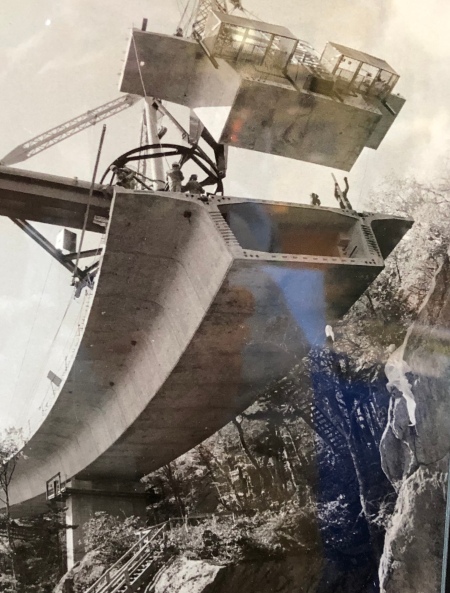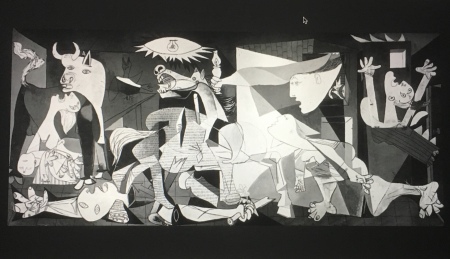When we first came to Boone, the town in North Carolina where Pat and I raised our three young’uns, I had a job that lasted a few years, tieing steel rebar in the Linn Cove Viaduct.
It was a bridge that happened to be the final section–the Missing Link–of a 469-mile National Park road, the Blue Ridge Parkway. Why this missing link, which was located pretty much in the middle of the whole road project, took so long to get built is a long story.
That story will form part of the narrative of a new novel, which I have recently begun researching and writing. The working title is Search for Blue.
Back in the 1950’s, ’60’s and 70’s, a gaggle of disagreements had confounded any beginning of constructing that Missing Link. When they finally got the issues settled between owners of Grandfather Mountain and the National Park Service, construction of the final Blue Ridge Parkway section was begun in 1979.
And I helped. While the missing link was being built, it looked something like this:
Recently, I, being now in what used to be called old age (but only 68!), I began to wonder what the cessation of work might have been like for a workman who had labored on that Parkway project “back in the day.”
This book will tell the tale that I uncover. Here’s an excerpt from chapter 1 of “Search for Blue.”
But in October of ’29 the whole damn thing just stalled out, real sudden like, stone-cold dead in its tracks.
By that time, marauding manufacturing and rabid farming had stirred up a dust bowl in the wide prairies and a cloud of manifest debilitation over our formerly manifested destiny. Monetary manipulation absconded the bold thrust of old-fashioned capital-driven progress; frantic philandering pushed quaint front-porch watch-the-world-go-by domestic tranquility into a ragged soup line.
1920’s roaring jibber-jabber got lost in 1930’s Depression regression. The country had shifted from financed euphoria to unemployed stuporia, and so in the election of ’32 we rolled Mr. Roosevelt into the White house on a Democrat wheelbase of socializing progressivism; The new President, former governor of New York, wasted no time in arm-twisting the nation right on over into his New Deal.
As the dust of dystopia settled, some forlorn Americans pined for the good ole days. Ah, they said, those were the days. Wish we’d seen it coming!
It didn’t take them New Dealers too long to figure out that what was needed was to get people working again, and fast.
Congress, shell-shocked by the deadening thunder of an American business-industrial dynamo self-destructing, got themselves hellbent on a string of programs to shorten–if not eliminate–the lengthening unemployment lines. Their legislating fervor reached way, way far–even as far as somewhere over the rainbow–and so they laid hold of the pot of gold!
But when the vessel was recovered, it turned out to be–not a pot of gold, but–a soup pot, and a damn-near empty one at that. So they set themselves to re-filling it, although not with gold. There wasn’t, by that time, much of the precious yellow stuff around. They had to begin filling the empty rainbow pot with . . . soup!
Out on the street, maybe while waitin’ in line for the soup, Joe Blow–or maybe it was Jane Doe–came up with a name for the collection of work and improvement programs that Congress was dishing out: “alphabet soup.” Take a gander at this list: FERA, FCA, NIRA, PWA, FFMC, CWER, AAA, EBA, FDIC, FHA, NRA, NLRB, RA, REA, SEC, SSA, TVA, to name just a few, and we’ll certainly not fail to mention the two work outfits destined to be the most productive in our present scouting-out-the-land, search for Blue expedition: CCC and WPA, which is the easy way of sayin’ Civilian Conservation Corps and Works Progress Administration.
Since Mr. Roosevelt had proclaimed we had nothing to fear but fear itself, one of Congress’ first assaults against the dreaded enemy actually took aim at that “fear itself.”
In an inspired idea to nullify the power of the enemy attitude, our lawmakers scrambled the word “fear.” They appropriated the letters. . . f, e, a, and r, reassigned them to a nobler cause, and came up with the Federal Emergency Relief Act of 1933, which came to be known as: FERA!
And that was one of the early servings of the alphabet soup; it got ladled into the bowls and hands of millions of unemployed Americans.
Most of the work was cranked up in the urban districts; city folks were much more dependent on the system than country folk. Out on the farms, people might be broke, and they might be deprived of some of the so-called necessities of modern life, but at least they had some ground out back to scratch a few seeds into the good earth and thereby harvest unto themselves some corn, beans, or potatoes to serve at dinner time. They might even still have a hog or two or a cow or at least a few chickens peckin’ around to have for some future supper time embellishment.
All that said, the farm folks did have their share of the alphabetizing bonanza that Congress was serving: AAA, FCA, FFMC etcetera etcetera. One way or another, everybody got a little help.
Back in that day and time, most men could still wield a shovel or a hoe. Even if they hadn’t done much with such tools as that, they or their kin were probably close enough to the land to at least know something of how to handle an implement.
As it turned out, a lot of them programs that the New Dealers came up with did involve shovels and hoes and rakes and such. By ‘n by, some Republicans who were not so convinced about the efficacy of Mr. Roosevelt’s wheelin’ dealin’ job programs–they hit upon the shovel as a symbol of the gaggle of “do nothing” alphabetized boondoggle make-work crews who spent more time leaning on their shovels than actually wielding them for the betterment of the country.
But that’s just politics. They’ll never get all that mess straightened out.
Probably about three years from now, I’ll have the rest of it done so you can read about how it all came together over fifty years of time.
Meanwhile, find a good book to read, today! You can find one here:


